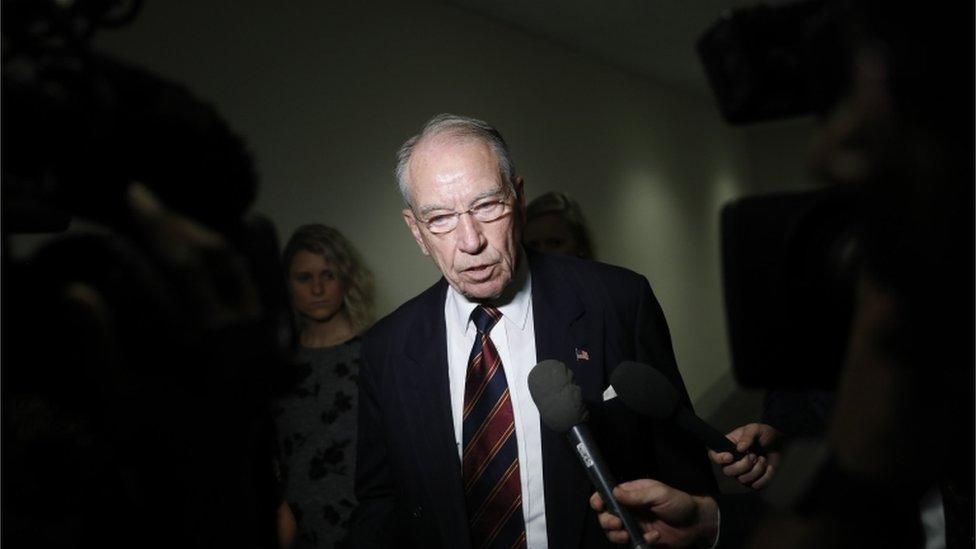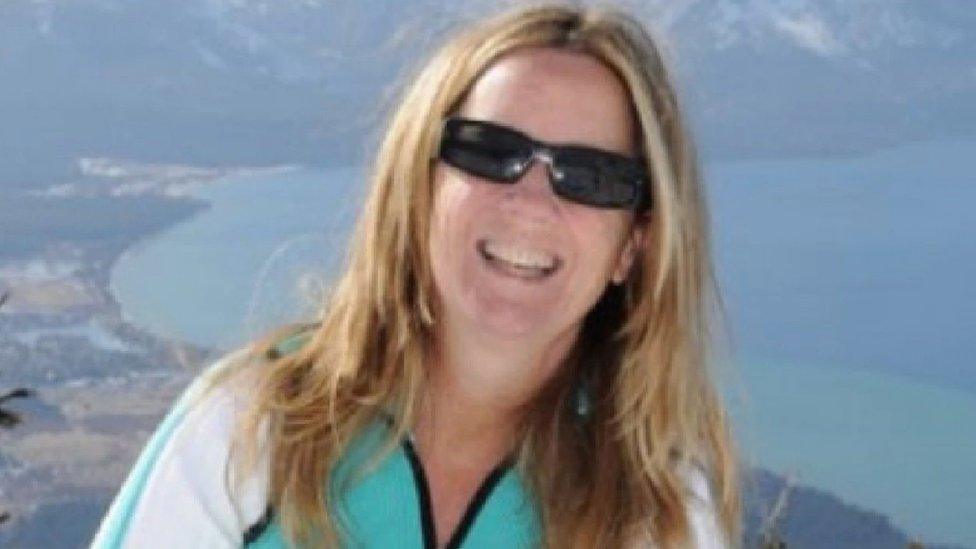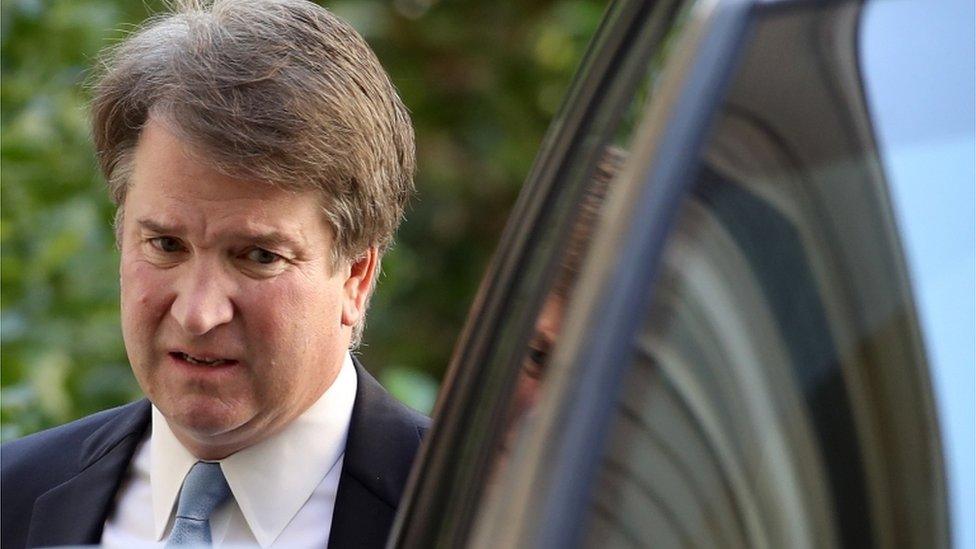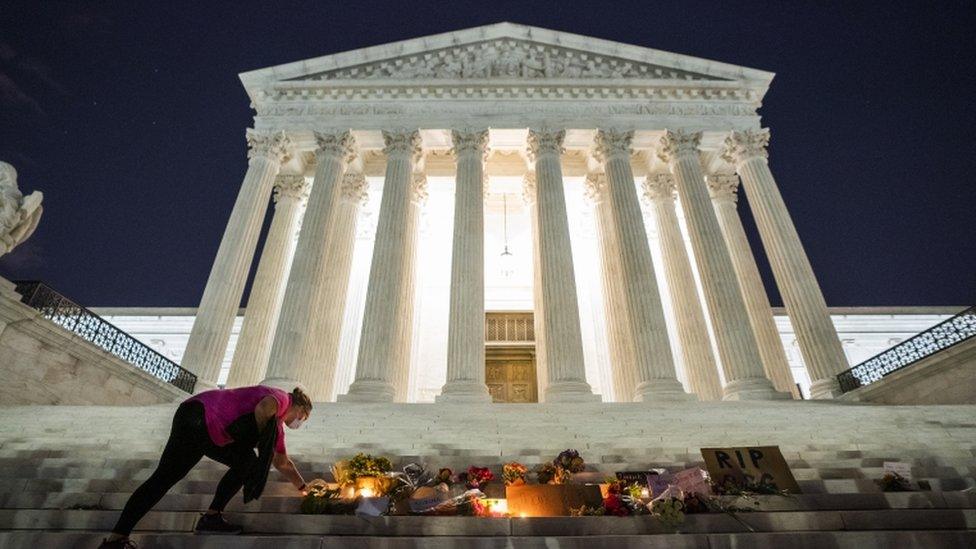Brett Kavanaugh: Senate sets deadline for accuser testimony
- Published

Republican Senator Chuck Grassley of Iowa, chairman of the judiciary committee, has set a Friday deadline for Christine Blasey Ford
The Senate has given a woman who accuses Supreme Court nominee Brett Kavanaugh of sexual assault until Friday to decide if she will testify.
Senate Judiciary Committee Chairman Chuck Grassley sent a letter setting the 21 September deadline to Christine Blasey Ford's lawyers.
Judge Kavanaugh, 53, has firmly denied the allegation. He has been meeting with White House officials this week.
Prof Ford declined to testify unless the FBI begins investigating the judge.
Her lawyers have said the California psychology lecturer is receiving death threats and has had to move home since alleging the nominee tried to rape her 36 years ago.
Judge Kavanaugh, 53, has labelled the claim "completely false".
The Senate Judiciary Committee has called on both Judge Kavanaugh and Prof Ford to testify - either publicly or in a closed-door session - next Monday.
Senator Mazie Hirono urged "the men in this country" to "do the right thing for a change"
Prof Ford's legal team has declined the Senate's offer to testify.
Her lawyer Lisa Banks said that before her client goes to Congress, she wants an FBI investigation into Judge Kavanaugh.
In a statement on Wednesday Ms Banks said that the Committee's plan to move forward with a hearing that has only two witnesses is "not a fair or good faith investigation".
"There are multiple witnesses whose names have appeared publicly and should be included in any proceeding," the statement reads.
"The rush to a hearing is unnecessary, and contrary to the Committee discovering the truth," it adds.
Why is the Senate setting a deadline?
In his letter to Prof Ford's legal team, Mr Grassley said "it is not the FBI's role to investigate a matter such as this".
"I have reopened the hearing because I believe that anyone who comes forward with allegations of sexual assault has a right to be heard, and because it is the Committee's responsibility to fully evaluate the fitness of a nominee to the Supreme Court," the Iowa Republican wrote.
The Senate, the committee chairman notes, "and only the Senate", is tasked with vetting a president's Supreme Court nominee.
"The FBI does not make a credibility assessment of any information it receives with respect to a nominee.
"Nor is it tasked with investigating a matter simply because the Committee deems it important."

Prof Ford says Brett Kavanaugh pinned her to a bed and tried to take off her clothes
Back in 1991, however, the FBI did investigate sexual harassment claims against then-Supreme Court nominee Clarence Thomas.
The White House under President George H W Bush ordered that inquiry. It took three days, CNN notes, and the claims by Anita Hill were dismissed as unfounded.
Judge Thomas was narrowly confirmed and he remains a Supreme Court justice.
Mr Grassley's letter states that Prof Ford has until Friday morning to provide the committee with her prepared testimony and biography if she plans to testify next Monday.
He said he was "disturbed" to hear that she had been facing threats and harassment, but urged her to speak before the committee.
"You have stated repeatedly that Dr Ford wants to tell her story. I sincerely hope that Dr Ford will accept my invitation to do so, either privately or publicly, on Monday."

Judge Kavanaugh has been meeting with officials at the White House this week
Prof Ford has accused him of drunkenly trying to remove her clothing at a house party in a Washington DC suburb in 1982 when they were both teenagers.
She says he pinned her to a bed and clamped his hand over her mouth when she tried to scream.
Anita Hill - whose allegation against Clarence Thomas has drawn endless parallels with the Ford-Kavanaugh controversy - says the accuser must not be hurried.
"Do not rush these hearings," she wrote in an opinion piece for the New York Times, external.
"Doing so would not only signal that sexual assault accusations are not important."
What are Trump and other Republicans saying?
On Wednesday, President Donald Trump continued to support his nominee, telling reporters outside the White House: "He is such an outstanding man, [it is] very hard for me to imagine anything happened."
"I want to see what she [Prof Ford] has to say but I want to give it all the time they need," the Republican president said. "If she shows up that would be wonderful."
Republican Senator Lindsey Graham tweeted on Wednesday that it was "imperative" to move forward on the Kavanaugh vote.
Allow X content?
This article contains content provided by X. We ask for your permission before anything is loaded, as they may be using cookies and other technologies. You may want to read X’s cookie policy, external and privacy policy, external before accepting. To view this content choose ‘accept and continue’.

He has called the allegation against Judge Kavanaugh "a drive-by shooting".
"I'll listen to the lady, but we're going to bring this to a close," said the South Carolina senator.
Fellow Republican Susan Collins of Maine said on Wednesday that she hopes Prof Ford "will reconsider and testify" on Monday.
Allow X content?
This article contains content provided by X. We ask for your permission before anything is loaded, as they may be using cookies and other technologies. You may want to read X’s cookie policy, external and privacy policy, external before accepting. To view this content choose ‘accept and continue’.

Ms Collins and Alaskan Senator Lisa Murkowski are moderate Republicans who have voted with Democrats in the past, making them possible swing votes when it comes to Judge Kavanaugh.
Both have called on Judge Kavanaugh and Prof Ford to testify under oath.
On Wednesday, Senator Jeff Flake - who had previously said he would not decide his vote until hearing both testimonies - also called on Prof Ford to accept the Senate's invitation.
Allow X content?
This article contains content provided by X. We ask for your permission before anything is loaded, as they may be using cookies and other technologies. You may want to read X’s cookie policy, external and privacy policy, external before accepting. To view this content choose ‘accept and continue’.

Meanwhile, Democratic Senator Claire McCaskill - who is facing a tough re-election fight in Missouri - said she will "vote no on Judge Kavanaugh".
"My decision is not based on those allegations but rather on his position on several key issues, most importantly the avalanche of dark, anonymous money that is crushing our democracy," she said in a statement.
Allow X content?
This article contains content provided by X. We ask for your permission before anything is loaded, as they may be using cookies and other technologies. You may want to read X’s cookie policy, external and privacy policy, external before accepting. To view this content choose ‘accept and continue’.

- Published19 September 2018

- Published18 September 2018
- Published19 September 2020

- Published17 September 2018